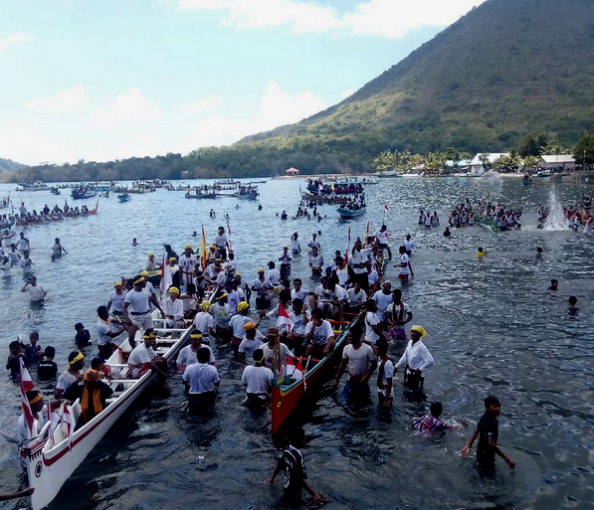
Anthon Jason | CRCS | Wednesday Forum Report

In Indonesia, people can be called by their homeland’s name, such as orang Batak, orang Sunda, orang Manado and so on. The Indonesian concepts that are tied tightly to ideas of land, community, and cosmology referred to as adat have a dynamic and complex relationship to people’s religious identification and how they understand their identities. People can be emplaced or displaced in regard to how their religious identity relates to their cultural identification with particular places. While emplacement is the process by which people identify themselves with a place, displacement is a dislocation, removal, expropriation, takeover, or ideological process to refute claims of rights over land, the use of cultural symbols, or the ability of people and groups to self-identify.
Dealing with this topic in her presentation at the CRCS-ICRS Wednesday Forum on April 5th, 2017, Dr Kelli Swazey talked about how that issue of emplacement and displacement has affected people, particularly the Christian population of the Banda Islands in Maluku. She revealed how the tourism industry, as the third largest industry in Banda, has influenced the way people think about Christians as the minority religion, but not the cultured minority, and how tourism has the potential to distance displaced Christians from the practices that identify them as Bandanese.
Dr. Swazey began her presentation with a historical reference to the Banda islands from a Chinese text in 1304, and later archaeological evidence of non-Islamic communities in the region until the early 16th century. In addition, she discussed a massive transformation in society in Banda islands: the massacre of the majority of the population of Banda people by Dutch forces, and the repopulation of the island with slaves brought from many other regions to work as laborers for the cultivation of spices. In short, Dr. Swazey wanted to address the question of who the Bandanese or Orang Banda asli are.
From historical and archaeological evidences, it is apparent that answering that question is no easy, particularly if the paradigm employed is the notion on keaslian, or some sort of racial purity. History has suggested that Bandanese were never really ethnically pure. Bandanese Christians were not a minority in culture because they shared in the cosmological and local belief systems of the island. However, after a conflict drove most of the Christian population from the islands, they began to lose access to land rights in the islands. This could be constitutive of a starting point of ethnogenesis based on religion. Ethnogenesis, as commonly understood, is the formation and development process of an ethnic group. This process emerges because of self-identification or, in the case of Bandanese Christians, the result of outsiders’ identification.
In challenging the notion of Christians being minority of Banda, Dr. Swazey suggested the definition by Eriksen (2010): minority is not only about the population but also the condition where one group is subordinate to another more dominant group that coexists but is either culturally, ethnically, socially or religiously distinct. Based on this framework, minority can happen at any time to any group. Through this, Dr. Swazey theorized that the tourism industry is contributing to a process of minoritization for displaced Bandanese Christians.
Dr. Swazey suggested that we should be concerned about the influences of the tourism industry, as the process of reconstruction and representation employed in the industry is tied intimately with identity and to native concepts of authenticity, belonging, as well as national frameworks of recognition and representation. One of the policy trends of Indonesian tourism industry is to represent religious tourism for the convenience of certain tourists or to attract particular segments of tourists, like sharia tourism or halal tourism. This phenomenon can be both positive and negative.
In the process of reconstruction, tourism not only helps people understand who they ethnically or culturally are, but also helps embody what tourists want or they think what tourists want. It is a dialogical process. It has just much potential to inclusion as it does for exclusion. The mutually constitutive definitions of adat and agama play a role in defining who can claim ties to place and therefore claim recognition and authority.
*The writer Anthon Jason is CRCS student of the 2016 batch.

